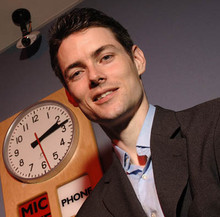
I've always worked in digital media. After all - my first job was carrying the radio station mobile phone. Back in 1989, mobile phones were the size of a small suitcase and the weight of a car battery. This mobile phone needed a skinny, slightly nervous man fresh out of school to carry for the slightly diminutive news journalist, who was grateful for the help.
We went out to cover a house fire in Bradford - light damage, but smelly. Nobody died, but the station still sent out a reporter to file a piece from the incident and then to interview a fireman on a Uher tape machine. This piece of audio was driven back to the station in the little pool car, edited on tape using something quite like sticky-tape and some chinagraph pens, transferred to an eight-track cartridge and played out on the next hour's rather stiffly-presented five-minute news bulletin.
Local commercial radio is certainly not staffed to such an extent: Pennine Radio, where I worked, had at least eight journalists quietly tapping away on typewriters on little thin bits of A5 thin paper.
But local radio still does a great job of local news. It's the main differentiator between national and local radio and consistently one of the main reasons why people continue to tune in.
The web now means that local radio can always have a local news presence: local news, 24 hours a day instead of the first three minutes of every hour. So last month for Journalism.co.uk I had a quick random search through what local radio is doing online in terms of news. Are the stations doing a decent job?
The first station I chose at random was U105 - the Belfast station which, as part of the same company that owns UTV, the ITV franchise in Northern Ireland, should have a decent shout at local news. But they lazily do nothing, linking to UTV's website instead. I was surprised at this: U105 wants to drive audiences away from its own website. I'd lay a bet that not all UTV's audience listen to U105, nor all U105's audience watch UTV. A missed opportunity - particularly since I'll bet you it's in a database on the same webserver.
A quick trip east to one of my old stomping grounds, Bauer's Viking FM in Hull, which has a local news section that at first looks impressive. The top story at the time was about the new photographic cigarette packet warnings, an admittedly entirely non-local story. But it's a good way of making radio more visual by directing your audience to see the new warnings that 'will appear on cigarette packets from today' - which would have been quite timely had the 'today' in question not passed six days ago.
Similarly a second story related to a woman who 'goes on trial today', but the trial's over, and has been since mid-August. The third story is about A-level results 'released today', which, if they're releasing A-level results in October, is certainly a story (except, naturally, they aren't). Oh dear.
Finally, I tried Global's Essex FM. You'd hope that the country's largest commercial radio group would get it right - and it has: the news is up-to-date, albeit undated; the writing's variable (some simply copy/pasted from the audio cues, some rewritten for the web), but at least it's there and updated.
Essex FM, like Viking, also has national news, travel and weather - indeed, the only slightly curious thing is the positioning of the local news below the national stuff. Nicely done.
Doing local news online could be as simple as making the latest audio bulletin available on-demand; or linking to products like Google News to give your local listeners the very best local news about the stories you're covering from all the local news sources available.
Slapping radio copy online looks weak and thin, but augmenting that with other information from the rest of the internet could still work.
And of course you'd expect the BBC's local websites to do this job well and, by and large, they do - even though it's a rather messy, inconsistent experience currently as the BBC's sites make the transition to their new designs.
Still my random surfing tells me that local newspaper websites have little to worry about from some of their commercial radio colleagues. I wonder what my mobile-phone-challenged colleague would have thought of that nearly twenty years ago?
Free daily newsletter
If you like our news and feature articles, you can sign up to receive our free daily (Mon-Fri) email newsletter (mobile friendly).









